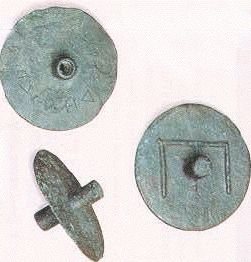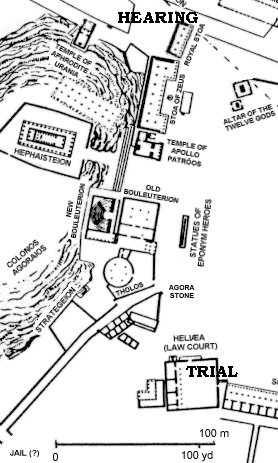
Ballot disks from the fourth-century B.C.E.
Initiation of Criminal Proceedings
In Athens, at the time of the trial of Socrates, there was no public prosecutor. Instead, judicial proceedings could be initiated by any citizen. In the case of Socrates, the proceedings began when Meletus, a poet, delivered an oral summons to Socrates in the presence of witnesses (or callers). The summons required Socrates to appear on a specified date before the legal magistrate, or King Archon, in a colonaded building called the Royal Stoa to answer charges of impiety. [Plato's Euthyphro takes place on the portico of the Royal Stoa where Socrates encounters Euthyphro, before he enters the building to answer Meletus's charges.] Once the Archon determined--after listening to Socrates and Meletus (and perhaps the other two accusers, Anytus and Lycon)--that the lawsuit was permissible under Athenian law, a date was set for the "preliminary hearing" (anakrisis) and terms for the hearing were posted as a public notice at the Royal Stoa.
The Preliminary Hearing (Anakrisis)
The preliminary hearing before the magistrate at the Royal Stoa began with the reading of the written charge by Socrates' accuser, Meletus. Socrates then formally answered the charge. Both the written charge and denial were then attested to by each, under oath, as being true. The next phase of the preliminary hearing was one of interrogation: the magistrate questioned both Meletus and Socrates, and then both the accuser and defendant were allowed to question each other. In the final phase of the hearing the magistrate, having found merit in the accusation against Socrates, drew up formal charges and set a date for a public trial.
The words of the charges against Socrates (relating to impiety and corruption of youth), preserved as a public document (antomosia), survived until at least the second century C.E., but were subsequently lost.

Map showing location of Royal Stoa and Heliaia (law court) in central Athens
(Portion of larger map of Bernard Suzanne. Reprinted with permission.)
The Trial
The trial of Socrates took place over a nine-to-ten hour period in the People's Court, located in the agora, the civic center of Athens. The jury consisted of 500 male citizens over the age of thirty, chosen by lot from among volunteers. Athens used very large numbers of jurors, from 500 to as many as 1501, in part as a protection against bribes: who could afford to bribe 500 people? All jurors were required to swear by the gods of Zeus, Apollo, and Demeter the Heliastic Oath:
"I will cast my vote in consonance with the laws and decrees passed by the Assembly and by the Council, but, if there is no law, in consonance with my sense of what is most just, without favor or enmity. I will vote only on the matters raised in the charge, and I will listen impartially to the accusers and defenders alike."
Most of the jurors were probably farmers, as that was the principal occupation of the day. For their jury service they received payment of three obols. The jurors sat on wooden benches separated from spectators by some sort of barrier or railing. Given Socrates's fame and the notoriousness of the charge against him, the crowd of spectators was most likely large--including, of course, the most famous pupil of Socrates, Plato.
The trial began in the morning with the reading of the formal charges against Socrates by a herald. Few, if any, formal rules of evidence existed. The prosecution presented its case first. Meletus, Anytus, and Lycon had three hours, measured by a waterclock, to make their argument for a finding of guilt. Each accuser spoke from an elevated stage. No record of the prosecution's argument against Socrates survives.
Following the prosecution's case, Socrates had three hours to answer the charges. Although many written versions of the defense--or apology--of Socrates at one time circulated, only two have survived: one by Plato and another by Xenophon.
Following the arguments, the herald of the court called on the jurors to consider their decision. In Athens, jurors did not retire to a juryroom to deliberate--they made their decisions without discussion among themselves, based in large part on their own interpretations of the law. The 500 jurors voted on his guilt or innocence by dropping bronze ballot disks of the sort pictured above into marked urns. Only a majority vote was necessary for conviction. Four jurors were assigned the task of counting votes. In the case of Socrates, the jury found Socrates guilty on a relatively close vote of 280 to 220. (Interestingly, if less than 100 jurors voted for guilt, the accusers had to pay a fine to cover trial costs.)
If a defendant is convicted, the trial enters a second phase to set punishment. The prosecution and the defendant each propose a punishment and the jury chooses between the two punishment options presented to it. The range of possible punishments included death, imprisonment, loss of civil rights (i.e., the right to vote, the right to serve as a juror, the right to speak in the Assembly), exile, and fines. In the trial of Socrates, the principal accusers proposed the punishment of death. Socrates, if Plato's account is to be believed, proposed first the punishment--or, rather, the non-punishment--of free meals in the center of the city, then later the extremely modest fine of one mina of silver. Apparently finding Socrates' proposed punishment insultingly light, the jury voted for the prosecution's proposal of death by a larger margin than for conviction, 360 to 140.
The execution of Socrates was accomplished through the drinking of a cup of poison hemlock.
Historical Note
The first use of juries in Athens coincided with the founding of Athenian democracy in 590 B.C.E. A council ran both the government and the court system.
In 463 B.C.E., Pericles transferred power from the aristocrat-controlled courts--courts that had jealously protected private property rights--to people's courts. By all indications, the early Greeks were a litigious lot. Even Pericles found himself sued in a civil case.
When Rome captured Greece in 146 B.C.E., the use of people's courts came to an end.
